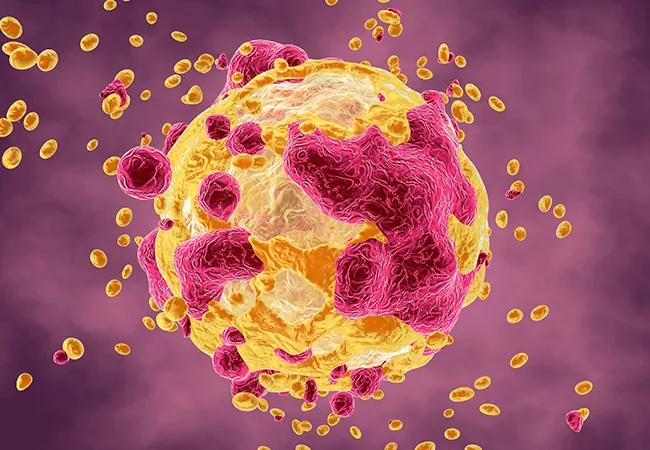Previous studies, trial aims and the potential role of immunotherapy

A new clinical trial at Cleveland Clinic is exploring the role of stereotactic body radiotherapy (SBRT) on the immune system of adolescent and young adult patients with metastatic or unresectable sarcoma. Previous findings hint at the tool’s potential predictive advantage in determining local oncologic control and overall survival outcomes in patients.
Advertisement
Cleveland Clinic is a non-profit academic medical center. Advertising on our site helps support our mission. We do not endorse non-Cleveland Clinic products or services. Policy
Erin Murphy, MD, radiation oncologist at Cleveland Clinic and the trial’s principal investigator, explains, “This trial comes from a question I asked of our large series, which was simply “Is there any impact on the patient’s immune system when using this therapy?”
The short answer is yes. The team measured immune parameters at different intervals during treatment and follow-up and found that changes in the neutral-to-lymphocyte ratio (NTLR) in a complete blood count reflected patients’ local control efficacy and overall survival.
She explains: “In our previous study, we found that specific immune cell concentrations are modifiable after SBRT, and these changes in immune cell populations can help accurately predict both local control efficacy and overall survival of these patients.”
These data set the stage for the trial’s primary aim: measuring NTLRs in a prospective cohort of adolescent and young adult patients with metastatic or unresectable sarcoma.
The study intervention will not alter patients’ standard of care. Patients who are age 12 and older and indicated for the biologically effective dose of > 95 Gy of SBRT for metastatic or unresectable sarcoma are eligible for the trial. The trial includes additional laboratory work before and after treatment and twice in follow-up. Standard laboratory tests are also needed in three of four of the study’s time points, which the investigators hope will make involvement straightforward.
“We wanted to be very conscious that this was not a burden to patients,” says Dr. Murphy.
Advertisement
Previous findings also provide the basis for secondary and exploratory aims of the study. The team identified that a biologically effective dose of at least 95 Gy SBRT significantly improved local control of metastatic sarcoma with minimal toxicity and good quality of life (QoL) outcomes. They will continue to analyze control, safety and QoL endpoints.
Because sarcomas are generally more resistant to radiation, approaches to radiotherapy need to be aggressive to limit recurrence. With relatively limited data in a pediatric population, there has been some hesitancy within the radiation oncology community to use this tool out of concern for its toxicity.
Dr. Murphy has presented nationally and internationally on the topic, advocating for its benefit in select patients. “We’ve shown that when delivered in a thoughtful, multidisciplinary setting, SBRT is an effective treatment for cancer control with a minimal impact on patients’ quality of life.”
Colleagues from Cleveland Clinic’s Center for Immunotherapy & Precision Immuno-Oncology are also important collaborators and will be examining immune and inflammatory markers from routine laboratory work and correlating these with patients’ overall survival outcomes.
“It’s observational at this point, but we are looking to see if there are any patterns and how we can potentially capitalize on the information and define the role of immunotherapy for these patients to optimize their treatment regimen,” she concludes.
Advertisement
Advertisement

First-of-its-kind research investigates the viability of standard screening to reduce the burden of late-stage cancer diagnoses

Global R&D efforts expanding first-line and relapse therapy options for patients

Study demonstrates ability to reduce patients’ reliance on phlebotomies to stabilize hematocrit levels

A case study on the value of access to novel therapies through clinical trials

Findings highlight an association between obesity and an increased incidence of moderate-severe disease

Cleveland Clinic Cancer Institute takes multi-faceted approach to increasing clinical trial access 23456

Key learnings from DESTINY trials

Overall survival in patients treated since 2008 is nearly 20% higher than in earlier patients